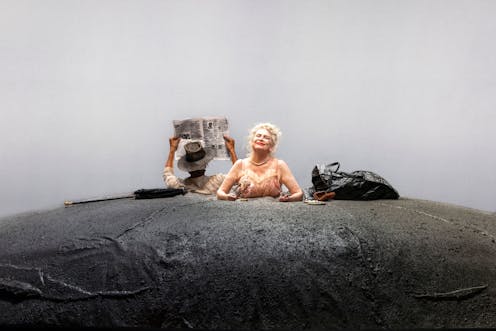Detta inlägg post publicerades ursprungligen på denna sida this site ;
Date:
Author: Alexander Howard, Senior Lecturer, Discipline of English and Writing, University of Sydney
Original article: https://theconversation.com/pamela-rabe-shines-in-this-hypnotic-revival-of-samuel-becketts-classic-play-happy-days-254068

Samuel Beckett is justly regarded as one of the greatest playwrights of the 20th century – and unquestionably one of the most demanding. Few of his works illustrate this more clearly than Happy Days, first performed in 1961, and currently playing at the Sydney Theatre Company.
The premise of this visually arresting two-act play – notable as Beckett’s first play to feature a central female character – is simple and simultaneously astonishing.
A middle-aged woman, Winnie, is buried in a low mound of scorched earth in a barren, sun-blasted landscape. She is buried up to her waist in the first act, and up to her neck in the second.
Her near-silent and largely unseen husband, Willie, isn’t buried himself but appears to lack the means (and possibly the desire) to dig her out. No explanation is ever given for Winnie’s predicament.
Each day starts and ends with the piercing ring of a bell. These are Winnie’s only markers of time. She fills the interminable hours with relentless chatter: an increasingly hopeless attempt to hold despair at bay, while clinging desperately to a sense of routine.
She rations out her dwindling resources and ritually inspects her few remaining possessions: a toothbrush, a lipstick, a mirror, a parasol, a magnifying glass, a comb and, more disturbingly, a small revolver.
Tackling a psychologically complex character
Beckett’s authorised biographer, James Knowlson, points out that when Happy Days premiered, its “starkness and boldness” surprised and bewildered audiences more accustomed to naturalistic forms of theatre.
Critics were initially divided on the play. But with its existential exploration of universal themes such as isolation, time and endurance, it has since become regarded as not only one of the most significant works in Beckett’s oeuvre, but one of the greatest achievements in theatre history.
Indeed, the esteem in which Happy Days is now held can be seen in comparisons made between Winnie and Shakespeare’s Hamlet.
This parallel isn’t nearly as far-fetched as it might seem at first. For one thing, Winnie directly quotes from Shakespeare’s famous tragedy early in the first act.

Brett Boardman//Sydney Theatre Company
Also, much like Hamlet, she is a character of great psychological complexity, prone to lengthy reflections on the nature of existence, the passage of time and mortality. Her monologues, like Hamlet’s, are freighted with irony, melancholy and flashes of mordant humour.
That such a link can be made speaks not only to the strength of Beckett’s writing, but also to the extraordinary challenge – and opportunity – presented by the role of Winnie, for any actor brave enough to take it on.
Pamela Rabe delivers a truly mesmeric performance as Winnie in the Sydney Theatre Company’s outstanding rendition of Happy Days. She seems highly aware of the role’s magnitude:
People talk about it being the kind of female Hamlet. I think, well, Jesus, in Hamlet there’s at least another 12 people on the stage.
Initially approached by former artistic director Kip Williams, Rabe was hesitant to take on the part. She admits playing Winnie was “definitely not on my bucket list”. However, the challenge ultimately proved irresistible.
Rabe described the process of getting to grips with Beckett’s “meticulous” dramatic prescriptions and constructing Winnie’s world as
part maths, part archaeology, part slapstick, and very much a privilege. She’s endearing, mercurial, resourceful, wilful, occasionally a bit silly but always full of life.

Brett Boardman//Sydney Theatre Company
A contemporary spin with wit and pathos
The production, conceived and directed by Rabe and renowned lighting designer Nick Schlieper, does justice to Beckett’s original vision, while offering a new spin on this most canonical of plays.
Consider, for instance, the creative team’s striking decisions when it came to set design and staging. While their choices honour Beckett’s stated demand for “maximum simplicity”, they also depart in key visual respects. Gone are the “scorched earth” and “blazing sun” Beckett called for in his original stage directions.
Instead, Schlieper offers us something approximating a post-apocalyptic tableau: the stage is framed by a narrow proscenium-like window, behind which Winnie, and occasionally Willie (played excellently by Markus Hamilton) appear. This window is set against a monochromatic and featureless void.
The ash-coloured mound, which brings to mind Mark Rothko’s desolate final abstract expressionist canvases, is amorphous and otherworldly – a monstrous fusion of congealed lava and nuclear slag. Everything is beautifully rendered and deeply unsettling.
These eerie abstractions heighten the play’s existential stakes, forcing the audience to reckon with the sheer horror of Winnie’s situation, while showcasing the talents of an actor capable of infusing the bleakest of scenarios with wit and pathos.
They also ensure the production feels contemporary and resonant – particularly in an age haunted by environmental catastrophe and ecological collapse – without retroactively imposing present day values and concerns onto the past.
Something tells me Beckett, who consistently eschewed easy and all too often reductive interpretations of his work, would have approved.
![]()
Alexander Howard does not work for, consult, own shares in or receive funding from any company or organisation that would benefit from this article, and has disclosed no relevant affiliations beyond their academic appointment.